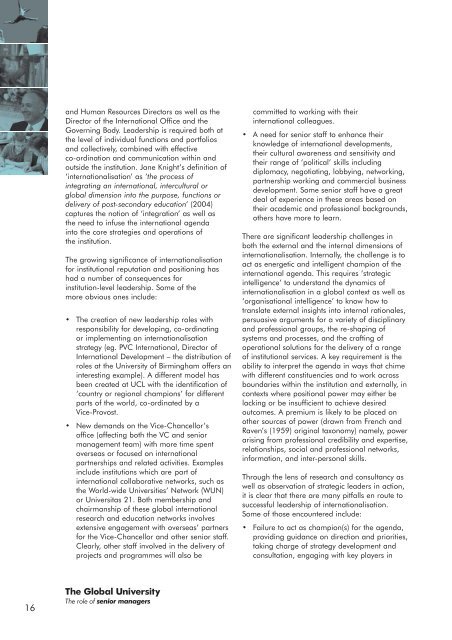HE senior mgrs_Apr18 - Bournemouth University
HE senior mgrs_Apr18 - Bournemouth University
HE senior mgrs_Apr18 - Bournemouth University
You also want an ePaper? Increase the reach of your titles
YUMPU automatically turns print PDFs into web optimized ePapers that Google loves.
and Human Resources Directors as well as theDirector of the International Office and theGoverning Body. Leadership is required both atthe level of individual functions and portfoliosand collectively, combined with effectiveco-ordination and communication within andoutside the institution. Jane Knight’s definition of‘internationalisation’ as ‘the process ofintegrating an international, intercultural orglobal dimension into the purpose, functions ordelivery of post-secondary education’ (2004)captures the notion of ‘integration’ as well asthe need to infuse the international agendainto the core strategies and operations ofthe institution.The growing significance of internationalisationfor institutional reputation and positioning hashad a number of consequences forinstitution-level leadership. Some of themore obvious ones include:• The creation of new leadership roles withresponsibility for developing, co-ordinatingor implementing an internationalisationstrategy (eg. PVC International, Director ofInternational Development – the distribution ofroles at the <strong>University</strong> of Birmingham offers aninteresting example). A different model hasbeen created at UCL with the identification of‘country or regional champions’ for differentparts of the world, co-ordinated by aVice-Provost.• New demands on the Vice-Chancellor’soffice (affecting both the VC and <strong>senior</strong>management team) with more time spentoverseas or focused on internationalpartnerships and related activities. Examplesinclude institutions which are part ofinternational collaborative networks, such asthe World-wide Universities’ Network (WUN)or Universitas 21. Both membership andchairmanship of these global internationalresearch and education networks involvesextensive engagement with overseas’ partnersfor the Vice-Chancellor and other <strong>senior</strong> staff.Clearly, other staff involved in the delivery ofprojects and programmes will also becommitted to working with theirinternational colleagues.• A need for <strong>senior</strong> staff to enhance theirknowledge of international developments,their cultural awareness and sensitivity andtheir range of ‘political’ skills includingdiplomacy, negotiating, lobbying, networking,partnership working and commercial businessdevelopment. Some <strong>senior</strong> staff have a greatdeal of experience in these areas based ontheir academic and professional backgrounds,others have more to learn.There are significant leadership challenges inboth the external and the internal dimensions ofinternationalisation. Internally, the challenge is toact as energetic and intelligent champion of theinternational agenda. This requires ‘strategicintelligence’ to understand the dynamics ofinternationalisation in a global context as well as‘organisational intelligence’ to know how totranslate external insights into internal rationales,persuasive arguments for a variety of disciplinaryand professional groups, the re-shaping ofsystems and processes, and the crafting ofoperational solutions for the delivery of a rangeof institutional services. A key requirement is theability to interpret the agenda in ways that chimewith different constituencies and to work acrossboundaries within the institution and externally, incontexts where positional power may either belacking or be insufficient to achieve desiredoutcomes. A premium is likely to be placed onother sources of power (drawn from French andRaven’s (1959) original taxonomy) namely, powerarising from professional credibility and expertise,relationships, social and professional networks,information, and inter-personal skills.Through the lens of research and consultancy aswell as observation of strategic leaders in action,it is clear that there are many pitfalls en route tosuccessful leadership of internationalisation.Some of those encountered include:• Failure to act as champion(s) for the agenda,providing guidance on direction and priorities,taking charge of strategy development andconsultation, engaging with key players in16The Global <strong>University</strong>The role of <strong>senior</strong> managers





![[2012] UKUT 399 (TCC)](https://img.yumpu.com/51352289/1/184x260/2012-ukut-399-tcc.jpg?quality=85)




![Neutral Citation Number: [2009] EWHC 3198 (Ch) Case No: CH ...](https://img.yumpu.com/50120201/1/184x260/neutral-citation-number-2009-ewhc-3198-ch-case-no-ch-.jpg?quality=85)





